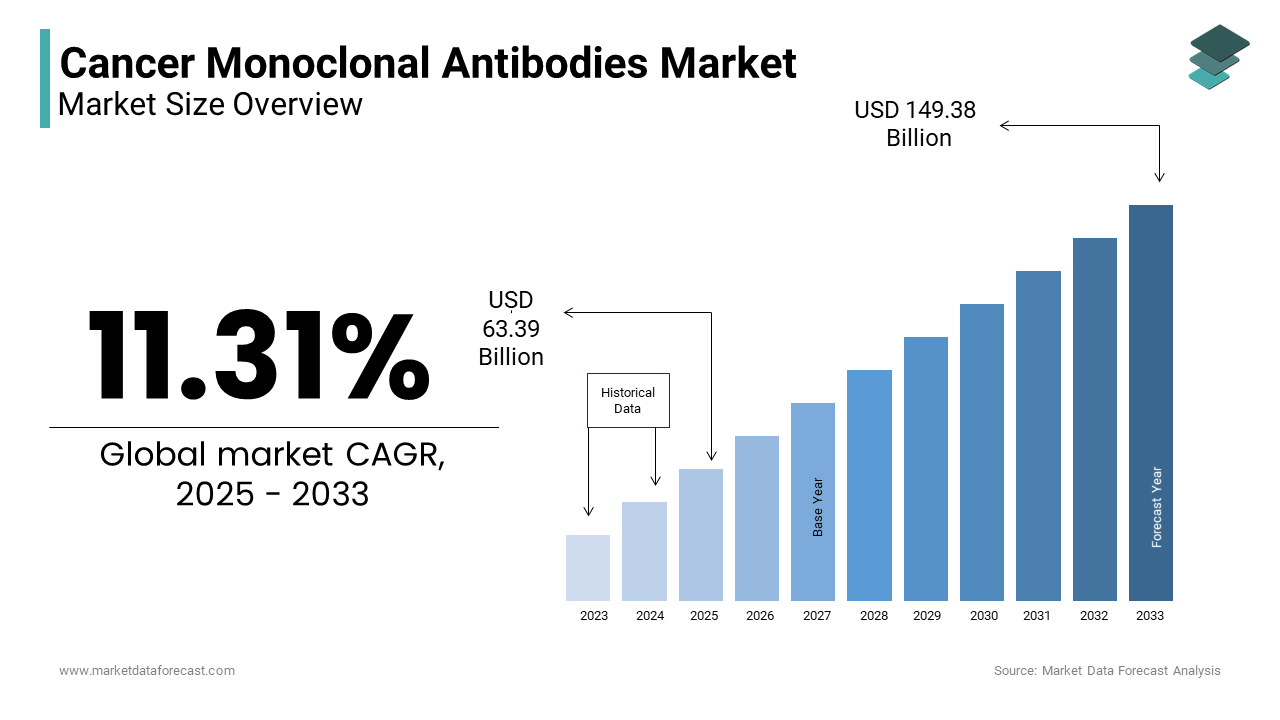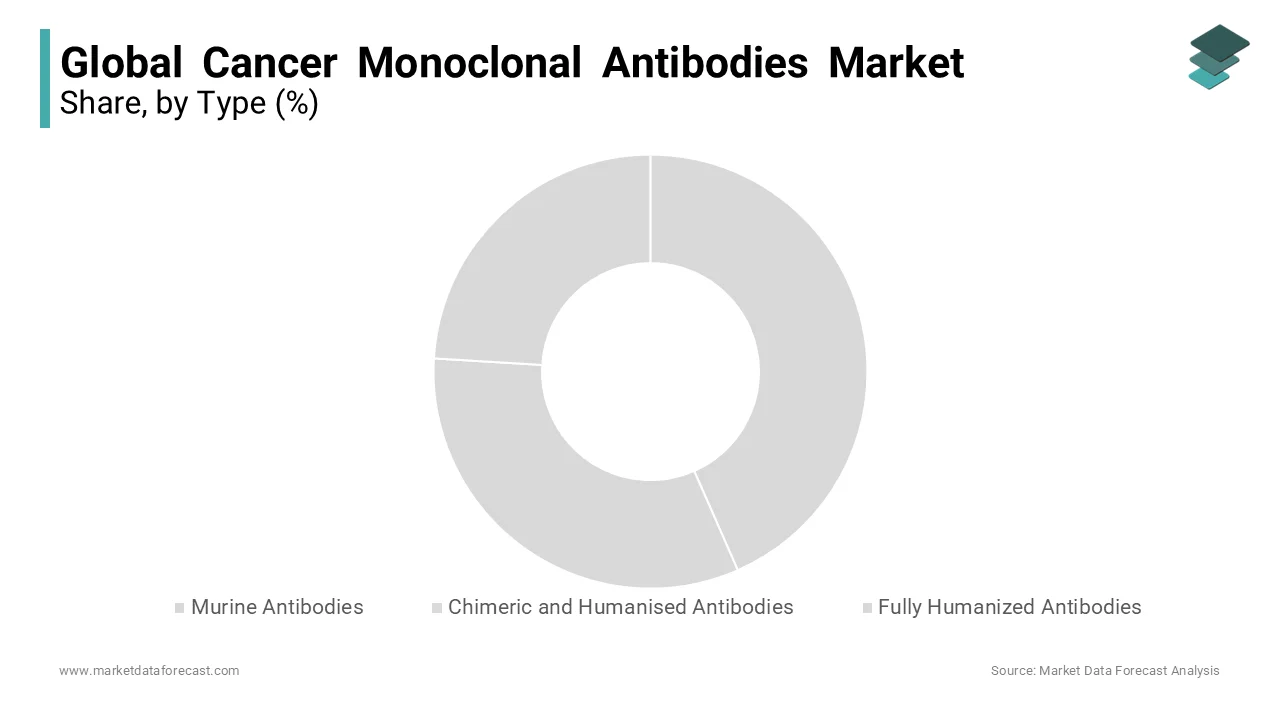Global Cancer Monoclonal Antibodies Market Size, Share, Trends & Growth Analysis Report – Segmented By Application (Liver, Breast, Brain, Blood, Hodgkins and Non-Hodgkins lymphoma, Colorectal, Leukemia and Others), Type (Murine Antibodies, Chimeric and Humanised Antibodies and Fully Humanized Antibodies, Conjugate Cancer Therapies & Region – Industry Forecast from 2024 to 2033
Global Cancer Monoclonal Antibodies Market Size
In 2024,the global cancer monoclonal antibodies market was valued at USD 56.95 billion and it is expected to reach USD 149.38 billion by 2033 from USD 63.39 billion in 2025, growing at a CAGR of 11.31 % during the forecast period.

Cancer is a severe disease causing millions of deaths worldwide every year. Cancer starts from a single cell and genetically transforms a normal cell into a tumor cell and gradually spreads to other cells. With the dramatic increase in the number of people affected by cancer, many pharmaceutical players invested in monoclonal antibodies. However, while the drugs treat cancer, chemotherapy agents have adverse side effects on normal and cancerous cells. Therefore, it prompted the increased usage of monoclonal antibodies to treat cancer. Monoclonal Antibodies (mAbs) are mono-specific antibody bodies comprising identical immune cell clones of a single parent cell and directed to specific cellular targets. Thus, monoclonal antibodies are highly customizable due to their nature and can play a crucial role in eliminating cancerous cells while sparing the normal cells during the cancer treatment. Monoclonal antibodies are proven more effective than chemotherapies and drugs for cancer treatment. Monoclonal Antibodies could offer less toxic and more efficient therapeutic alternatives to patients emerging in recent years. Monoclonal Antibodies are used to treat a wide array of autoimmune, inflammatory, and especially cancer.
MARKET DRIVERS
The rising prevalence of cancer worldwide is one of the major factors driving the cancer monoclonal antibodies market.
According to the WHO, cancer is the second leading cause of death globally, registering an estimated 9.9 million deaths, or 1 in 6 deaths, in 2019. Cancer associated with prostate, colorectal & liver is the most common cancer in men, while cancer associated with colorectal, lung, cervical & thyroid cancer is most commonly affected by women. Therefore, the increase in data should inform any national cancer policy, leading to a rise in the percentage of people choosing cancer treatment. In the health sector, cancer is one of the biggest concerns. Therefore, increasing monoclonal antibodies for cancer treatment boosts the market growth.
The growing investments for R&D of genomic studies and increasing progress and preference towards the specificity of monoclonal antibodies to attack cancer further contribute to the cancer monoclonal antibodies market growth. The dramatic increase in cancer patients has led many pharmaceutical players to invest in the cancer monoclonal antibodies market. Increasing investment in R&D of genomic studies, technological advancements in genetic sequencing and target gene selection, and a specificity of monoclonal antibodies to target only the cancer cells with no side effects are some of the market's driving forces. The increased prevalence of cancer is the key driver of the monoclonal antibodies market. With health products in the pipeline, it is expected to grow lucratively in the next five years.
Due to the growing demand, there is a rapid increase in R&D activities of genomic studies. This has led to a rapid rise in the cancer monoclonal antibodies market. In addition, it is also believed that the increase in the prevalence of breast cancer promotes the development of the global cancer monoclonal antibodies market.
MARKET RESTRAINTS
However, following regulatory guidelines for cancer-related monoclonal antibodies is a very rigorous process in most parts of the world. The guidelines provide a complete description of the manufacturing processes, including quality, good manufacturing practices, process validation, the potential for degradation, and the need for stability studies. Therefore, globally, there is a strict regulatory scenario like the US FDA, European Medicines Agency (EMA), and Korean FDA. Cancer antibodies also face similar restrictions in gaining approval for monoclonal antibodies in the market. As this is a long process, it is considered one of the main hurdles for this market. The growth of the cancer monoclonal antibodies market is a long period of research and development before clinical trials, the increase in mAbs failures in clinical trials and the high cost of the products defying the market's growth rate.
REPORT COVERAGE
|
REPORT METRIC |
DETAILS |
|
Market Size Available |
2024 to 2033 |
|
Base Year |
2024 |
|
Forecast Period |
2025 to 2033 |
|
Segments Covered |
By Application, Type, Conjugate Cancer Therapies, and Region |
|
Various Analyses Covered |
Global, Regional & Country Level Analysis, Segment-Level Analysis; DROC, PESTLE Analysis; Porter's Five Forces Analysis, Competitive Landscape, Analyst Overview of Investment Opportunities |
|
Regions Covered |
North America, Europe, APAC, Latin America, Middle East & Africa |
|
Key Market Players |
Amgen, Genmab, GlaxoSmithKline, Bristol Myers Squibb, Roche, Eli Lilly, Immunogen, Novartis, Seattle Genetics & Spectrum Pharmaceuticals. |
SEGMENTAL ANALYSIS
By Application Insights
The blood cancer segment held the leading share of the cancer monoclonal antibodies market in 2023 and is expected to perform well during the forecast period. The rising prevalence of blood cancer, the increasing number of advancements in antibody technology and the development of novel antibody-drug conjugates majorly propel the growth of the blood cancer segment.
The breast cancer segment is anticipated to showcase the highest CAGR in the global cancer monoclonal antibodies market during the forecast period. The growing incidence of breast cancer, rising awareness of early detection and the introduction of novel antibody-based therapies primarily drive the segmental growth.
By Type Insights
The murine antibodies segment had the largest share of the global cancer monoclonal antibodies market in 2023 and is estimated to grow at a healthy CAGR during the forecast period. The growing usage of murine antibodies in research and diagnostic assays and certain applications requiring the use of murine antibodies majorly drive segmental growth.

The fully humanized antibodies segment is predicted to register the fastest CAGR during the forecast period owing to factors such as minimal immunogenicity of fully humanized antibodies due to their human origin and enhanced binding affinity and specificity. The improved safety profile and simplified manufacturing process of fully humanized antibodies further contribute to the growth rate of the segment.
By Conjugate Cancer Therapies Insights
The radioimmunotherapy segment is forecasted to dominate the cancer monoclonal antibodies market during the forecast period due to the increasing number of cancer patients with the growing number of hospitals and diagnostic centers. Precise targeting and localized radiation therapy of radioimmunotherapy fuels segmental growth. The effectiveness of radioimmunotherapy for certain types of cancer and the potential for combination therapy with other treatment modalities further contribute to the growth rate of the segment.
REGIONAL ANALYSIS
North America dominated the global market in 2023 and is estimated to grow at a promising growth rate during the forecast period owing to the well-established healthcare infrastructure, increased government investments for infection control and management, and the rising commonness of lifestyle-related diseases. In addition, the North American region shows promising growth due to its rise in cancer research and technological developments. The U.S. cancer monoclonal antibodies market is forecasted to grow at a notable growth rate during the forecast period and held the largest share of the North American market in 2023. On the other hand, the Canadian market is expected to showcase a healthy CAGR.

Europe is anticipated to show a prominent CAGR during the forecast period owing to increased everyday awareness of autoimmune diseases, the cancer population, and rising funding for research and development. The growing market for biopharmaceuticals, favorable regulatory environment, the presence of well-established healthcare infrastructure, the presence of major market players and rising emphasis on precision medicine further fuel the growth rate of the European market. In Europe, U.K. and Germany are expected to account for the leading share during the forecast period.
The Asia-Pacific region is the most lucrative regional market and is predicted to showcase the fastest CAGR during the forecast period. Factors such as the rapid growth in the biopharmaceutical sector, the growing number of companies involved in biologics production and the presence of a large population and rising healthcare expenditures majorly propel the cancer monoclonal antibodies market in the Asia-Pacific region. The emergence of China and India as major players in the biopharmaceutical industry, an increasing number of advancements in healthcare infrastructure and rising emphasis on research and development activities further boost the growth rate of the APAC market. India and China are predicted to hold the major share of the APAC market during the forecast period.
Latin America is predicted to have a moderate growth rate during the forecast period. The growing investments in the healthcare sector, the rising prevalence of cancer, increasing demand for advanced therapies, the presence of a well-established pharmaceutical industry in countries like Brazil and Mexico, and regulatory harmonization efforts drive the Latin American market growth.
MEA is expected to register a sluggish CAGR during the forecast period. The growing healthcare spending and infrastructure development, rapidly growing biopharmaceutical industry, growing prevalence of cancer and growing number of initiatives to promote research and development in the pharmaceutical sector drive the MEA market growth.
KEY MARKET PLAYERS
The highly customizable nature of monoclonal antibodies attracts various organizations, research institutes, and multinational companies to use them to cure cancer. The major players in the Cancer Monoclonal Antibodies Market are Amgen, Genmab, GlaxoSmithKline, Bristol Myers Squibb, Roche, Eli Lilly, Immunogen, Novartis, Seattle Genetics & Spectrum Pharmaceuticals.
RECENT HAPPENINGS IN THE MARKET
- In 2020, Merck launched the biosimilar trastuzumab, a monoclonal antibody used to treat certain breast cancers.
- In 2018, Pfizer Inc. declared the US FDA approval of ZIRABEV (bevacizumab-bvzr). It is a biosimilar to Avastin (bevacizumab), which is indicated to treat five types of cancer, including locally advanced, relapsed or metastatic non-small cell lung cancer (NSCLC), metastatic colorectal cancer, non-metastatic renal cell carcinoma resectable (CCR), recurrent glioblastoma; and persistent, recurrent or metastatic cervical cancer. This is the second oncology monoclonal antibody biosimilar to gain FDA approval after TRAZIMERA (trastuzumab-qyyp) in March 2019. This new biosimilar may help increase access to impactful therapies, thereby accelerating competition in the market. As a result, it can potentially reduce costs and help meet the various demands of cancer patients.
- In 2016, ImmunoGen Inc. agreed with Merck to evaluate mirvetuximab soravtansine to treat patients with FRα-positive ovarian cancer.
MARKET SEGMENTATION
This research report on the global cancer monoclonal antibodies market has been segmented and sub-segmented based on application, type, conjugate cancer therapies, and region.
By Application
- Liver
- Breast
- Brain
- Blood
- Hodgkins and Non-Hodgkins Lymphoma
- Colorectal
- Leukemia
- Others
By Type
- Murine Antibodies
- Chimeric and Humanised Antibodies
- Fully Humanized Antibodies
By Conjugate Cancer Therapies
- Immunoliposome
- Radioimmunotherapy
- ADEPT
- Immunocytokines
- Others
By Region
- North America
- Europe
- Asia-Pacific
- Latin America
- Middle East and Africa
Frequently Asked Questions
How much was the global cancer monoclonal antibodies market worth in 2024?
The global cancer monoclonal antibodies market size was valued at USD 56.95 billion in 2024.
What is the CAGR of cancer monoclonal antibodies market?
Between 2022 to 2027, the global cancer monoclonal antibodies market is anticipated to be growing at a CAGR of 11.31%.
What are some of the major players in the cancer monoclonal antibodies market?
Amgen, Genmab, GlaxoSmithKline, Bristol Myers Squibb, Roche, Eli Lilly, Immunogen, Novartis, Seattle Genetics and Spectrum Pharmaceuticals are a few of the noteworthy players in the cancer monoclonal antibodies market.
Related Reports
Access the study in MULTIPLE FORMATS
Purchase options starting from
$ 2500
Didn’t find what you’re looking for?
TALK TO OUR ANALYST TEAM
Need something within your budget?
NO WORRIES! WE GOT YOU COVERED!
Call us on: +1 888 702 9696 (U.S Toll Free)
Write to us: sales@marketdataforecast.com
